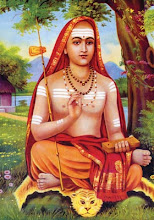While writing Ramayana Sage Valmiki has written as it is
story of greatest saadhvi Seetha and it contains killing of Paulastya ie.,
Ravana. Seetha displays exemplary character and shows the way for women of the
generations on how to carry one self. This writeup is just an effort to give a
glimpse of it with the small little knowledge I have of Ramayana.
Scenario1: Seetha’s Marriage:
Like lot of us misunderstand Seetha’s marriage is not
Svayamvara where she has chosen Rama to be her husband. It is King Janaka,
Seetha’s father who has announced Seetha as Veeryasulk ie., to get Seetha’s
hand as prize for being able to handle Siva’s bow. The moment Rama has done the
feat, she is declared as wife of Rama. Rama may be superior prince at that time
who is handsome, strong, educated, and rich but Valmiki writes down in Ramayana
that Seetha did not love Rama for the above qualities. She just loved him
because of only reason that he is her husband.
Scenario2: Rama’s journey to forests:
Seetha’s husband, Rama who is destined to become next king
has been instructed to go to forests for long duration of 14 years and to lead
life like a sage.
Aspect1: Seetha did not utter any word of displeasure to
Rama when his cards are down and has relinquished thrown to travel to dangerous
forests. It may be easy to love husband when he is having time of life but how
many women do not utter a word of insult when husband’s chips are down? This is
what she has to shown to the world on beahviour.
Aspect2: Rama was asked to leave to forest and he has
recommended Seetha to stay in the kingdom until he returns. In the choice
between struggles of forest and comforts of stayin in palace, Seetha chose the
former to stick with her husband during tough times and give him comfort of her
company.
Scenario3: Ravana’s torture:
Seetha was kept in Asoka vana and Ravana and his rakshasa
guards kept torturing her with words regularly. She has a choice between
keeping faith in Rama to comeback and succumb to persuations of Ravana. Ravana’s
offer looks tempting to any ordinary women as he has promised her power,
luxuries and sense gratification where as Rama’s comeback has lot of elements
of doubt associated with like whether he will be able to locate where Seetha
is, whether he will be able to gain victory over Rakshasas and their King
Ravana. But Seetha showed extrodinary grit and refused Ravana asserting firm
belief in her husband.
Scenario4: Hanuma’s offer:
When Seetha was frustrated by the torture being subjected by
Ravana, she found relief in the form of Hanuma who has informed her that Rama
is safe and will be coming in search of her. At this point in order to relieve
her of the torture Hanuma gave her an offer that he will take her at once back
to her husband. Seetha simply declined it citing many reasons like she might
fall in sea while Hanuma was fighting Rakshasa’s or Hanuma might have to face
lot Rakshasa’s challenges while taking her etc., But the major reson she cited
was she does not want to touch any other Purusha apart from her husband while
in full consciousness. Will there be any other women who in such situation
decline the offer holding up pativrata Dharma?
Scenario5: Rama’s Dharma:
Seetha is the wife who has understood her husband Rama
thoroughly and his Dharma Vrata. Two occasions Rama was and is continuously
under criticism that he has made a mistake testing seetha’s chastity through
Agni Pariksha and sending her to Valmiki Ashrama. But on both occasions too
Seetha did not make Rama any blame as she knows Rama stands by Dharma and
Dharma Sukhma is so difficult for other folks to comprehend. Seetha did not
blame Rama on these two occasions or run for support to other people, instead
she silently obeyed what her husband asked her to do.She did not question Rama's Dharma despite being at receiving end even though rest of the world questioned it.
